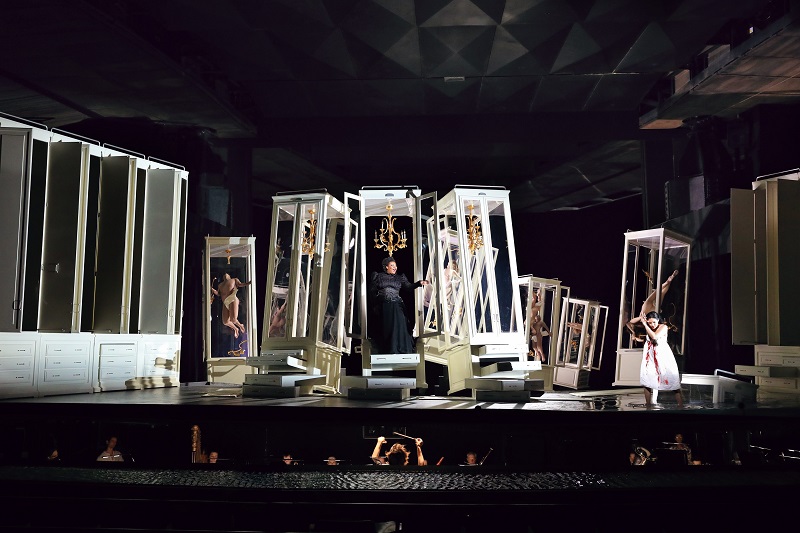
HOME-STRETCH SPRINT NEEDED
SANTA FE, NM—-Dvorak’s “Rusalka,” all about opera’s most famous water nymph, is too striking a fairy-tale drama to dissolve into a meandering finale. The composer with the rich romantic patina clearly had a far finer musical instinct than a theatrical one. At the risk of heresy, I’d propose engaging some current rewriter master (like formerly Rimsky-Korsakov, Ravel or Alfano) to revise and tighten up the dawdling ending of an otherwise sterling opera-tragedy.
In other regards, a reprise of this 1901 Czech opus here was a grand treat for the ears if not the eyes, with a consistent array of high-quality singers and a dazzling conductor in the pit, Lydia Yankovskaya, providing a sublime sensitivity. The title role was crowned by the Chicagoan spinto soprano Ailyn Pérez, with the limpid tones to enrich the best-known excerpt, “Song to the Moon.” Yet she had enough power, torment and anger to enkindle the later disillusionment with the Prince for whom the water sprite had literally given up everything in vain. Rusalka becomes the bean-bag thrown around casually by several heartless protagonists, when in the end all the nymph wanted was a beating heart and a lasting human love on terra firma (though whether an ephemeral human existence beats an eternity as water nymph is debatable). Her plaintive plea to the Witch Jezibaba, “Give me a human body!” encapsulates her terrestrial desire, even though the granted wish comes with a giant catch in which she, like a perch, is caught.
This opera is enriched by three female principals, each stunningly cast. The femme fatale seducing the dimwitted Prince is the Foreign Princess, arriving in a fire-engine red outfit aboard a gilded horse, dramatic soprano Mary Elizabeth Williams, who stops the show (and the Prince) at every turn, even in the rustic-courtly polonaise scene. Ms. Williams could power an entire Versailles-court motif single-handedly, even without her overt goose-stepping display (one of the best touches of Stage Director David Pountney). Competing with such razzle-dazzle, poor little Rusalka never stood a chance.
The witch of mezzo Raehann Bryce-Davis was masterful: Fearsome enough to terrify every one with her curses, yet just jaunty enough to reveal to the kiddies, well, don’t take me too seriously, it’s just a fairy tale. Yes, even curses can embody a comedic veneer. As Vodnik, Rusalka’s spirited father, bass James Cresswell furnished the foundation stone for many scenes, offsetting the weakling of a wandering-eyed weathervane Prince, tenor Robert Watson.
Visually, this Leslie Travers production was a disaster, with piles of chairs, a weird hospital setting, department-store display cases, and about as much water as the Mojave Desert. Doesn’t any one ever read the stage directions?
But there are myriad pleasures, including perhaps opera’s only duet with a witch, up to the drawn-out finale, where the dispatching of multiple principals is too spaced out for dramatic effect. We need our deaths rapid-fire, not with “Let’s dance” interludes. Trimming a few minutes out of a 3-hour opera is no sin.
DVORAK’S OPERA TRAGEDY “RUSALKA,” in Czech, three acts, one intermission, with translation projections. Santa Fe Opera (NM), through Aug. 22. Info at www.santafeopera.org or (505) 986-5900.